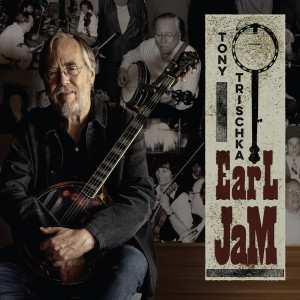 The story of this album has so many layers to it, it’s hard to know what to put in and what to leave out in a limited scope review like this. I’ll try to give as brief an introduction as I can and then get to the music.
The story of this album has so many layers to it, it’s hard to know what to put in and what to leave out in a limited scope review like this. I’ll try to give as brief an introduction as I can and then get to the music.
The 15 songs on this generous album were among some 200 informal recordings that modern bluegrass legend John Hartford made when he and his old friend Earl Scruggs got together (mostly at Earl’s house) to jam, over a period of several years beginning in the mid-1980s. Hartford eventually sent the recordings to a friend for safekeeping, and in 2020 that friend sent the recordings on a thumb drive to Tony Trischka, another friend of Scruggs’, as well as an acolyte, and the man who’s considered the father of contemporary bluegrass or newgrass. Trischka was so blown away by the recordings, most of which were of songs and tunes that Scruggs had never officially recorded and released, that he knew they had to be made public in some way.
So with the permission of the Scruggs and Hartford families, Trischka set about transcribing and learning Earl’s solos from those recordings note for note. Then he gathered the cream of the crop of today’s bluegrass, Americana, traditional country, and old time musicians to bring them to life. The names involved just take your breath away, a tribute to the respect this musical community pays to Scruggs as well as Tony Trischka. From a couple of older generations there’s Sam Bush, Béla Fleck, Darol Anger, Stuart Duncan, Bruce Molsky, Del McCoury (and son Ronnie), Vince Gill, Dudley Connell, and probably others I’m missing. Some of the younger virtuosos include Jason Carter, Brittany Haas, Michael Cleveland, Sierra Ferrell, Casey Drissen … and a bunch of the new crop of hot shots like Billy Strings, Dominick Leslie, Michael Cleveland, Jacob Jolliff, Lindsay Lou, Phoebe Hunt …
But of course at the head of the list is Tony Trischka. Or is that Earl Scruggs? Listening to Trischka’s renditions of Scruggs’ solos on these songs and tunes reminds me of an album I used to have of player piano rolls created by George Gershwin playing his own music — as close to the real thing as you’re going to get. And this LP or CD set is recorded beautifully, with instruments and singers in balance, everything crisp and sharp, and propelled by the grooving bass lines provided variously by Mike Bub, Jared Engel, Alan Bartram, Geoff Saunders, and Mark Schatz. The other old recording you might be reminded of is the Nitty Gritty Dirt Band’s original 1972 Will the Circle Be Unbroken. It’s a slab of excellently curated (mostly) traditional songs expertly performed and recorded by a highly talented multi-generational cast.
And what a bunch of songs! Every time through the album it seems I find a new favorite. It’s hard to get past the opener, the Demore Brothers’ “Browns Ferry Blues” with Billy Strings on guitar and vocal, plus Sam Bush on mando, Michael Cleveland fiddle, and Béla Fleck on what the liner notes say is a “definitely non-Scruggs banjo solo” in addition of course to Trischka on Earl’s solos and Tony’s own rhythm lines, an approach he follows throughout. Right on top of that comes the Bob Wills swing great “San Antonio Rose,” with Sierra Ferrell on soaring vocals. Darol Anger and Casey Driessen lay down multiple fiddle parts to mimic the sound of a big swing band, and Phoebe Hunt and Lindsay Lou provide sweet vocal harmonies.
Another high point is the jazzy, swinging take on “Freight Train Blues,” which Tony says is modeled more on an early Roy Acuff rendition than on Dylan’s from his debut album. This one features unhinged mandolin and fiddle solos from Jolliff and Cleveland (respectively) that match Dudley Connell’s high-energy, yodelling vocals. Then you forget about that one, when Molly Tuttle and Sam Bush share the vocal leads (their voices are so nice together!) on the Dillards’ song “Dooley,” with Tuttle (guitar), Bronwyn Keith Hynes (fiddle), Bush, and Trischka swapping solos. It’s also great to hear Tony and Brittany Haas playing call and response lines on “Little Liza Jane,” with the inimitable Del McCoury belting out the vocals.
I was totally prepared to dislike this album’s bluegrass cover of The Beatles’ “Lady Madonna,” and I’m still not crazy about the “song” aspects of this version. But when the Gibson Brothers and Jolliff (mandolin), Cleveland (fiddle) and Tony on banjo go to town on the instrumental portion, it’s absolutely electrifying. Their jazzy, bluesy breakdown in the second half of the track is utterly mesmerizing and very exciting. On the other hand, I like everything about the cover of the Carter Family’s trailblazing “Bury Me Beneath The Willow” except for Vince Gill’s vocals. He’s a great country singer, but I guess I’m too tuned in to the Carters’ masterfully understated recording to be comfortable with this more robust bluegrass treatment.
There are of course some equally excellent instrumental tunes, my favorite of which is the banjo-fiddle duet of Tony and Bruce Molsky on “My Horses Ain’t Hungry” and a solo banjo take on “Shout Little Lulu.” For the mandatory gospel portion there’s a lovely “Amazing Grace” sung by Ferrell with backing from the McCrary sisters Ann, Alfreda and Regina, with an a capella coda of the first verse as the album closer.
With so many great songs and great musicians, EarlJam is one of those albums that will reward repeated plays, each of which will reveal new riches. Fans of Americana music and its deep roots will love this collection. The circle does indeed remain unbroken.
(Down The Road Records, 2024)
